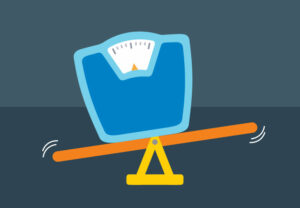It can be tough to maintain your weight loss. After all, it took a lot of hard work and dedication to lose the weight in the first place! But don’t worry, we’re here to help. In this blog post, we will discuss some tips for sticking to your diet and maintaining your weight loss. Following these tips will help you stay on track and reach your goals!
Contents
Importance Of Maintaining Weight Loss
 Maintaining a healthy weight is important for many reasons. It can help you avoid and control health conditions such as:
Maintaining a healthy weight is important for many reasons. It can help you avoid and control health conditions such as:
- High blood pressure
- Diabetes
- Heart disease
- Stroke
- Certain types of cancer
It can also help you feel good about yourself and have more energy. Plus, when you maintain your weight loss, you’re less likely to regain the weight you lost. So if you have already achieved weight loss, congratulations! The next step is to maintain that loss so you can continue to reap the benefits.
Tips For Maintaining Weight Loss
There is no one “right” way to maintain your weight loss. But there are some general tips that may help:
Find a support group
Finding a support group or someone to talk to who is going through the same thing can be helpful. When you have someone to lean on, it can make the journey easier. You can share tips, motivation, and progress with each other. It will not only make the process more bearable, but it can also help you stay on track. You can find support groups online or in your community. Do a search or ask your doctor for recommendations.
Set realistic goals
If your goal is to lose weight and keep it off, be realistic about how much weight you can lose. A healthy rate of weight loss is 0.45 to 0.55 kilograms (one to two pounds) per week. Losing weight too quickly is often not sustainable and can lead to yo-yo dieting, which can wreak havoc on your body. When setting your goals, aim for something that is achievable and realistic. It’s also important to set goals for yourself that are not solely focused on weight loss. For example, you might want to focus on eating more fruits and vegetables or being able to run a certain distance. These types of goals will help keep you motivated even when the scale isn’t budging.
Create a food diary
 One way to help you stay on track is to keep a food diary. This can help you become more aware of what you’re eating and how much. It can also help you identify patterns, such as emotional eating or eating when you’re not really hungry. If you’re trying to lose weight, a food diary can also help you see where you can cut back on calories. There are many apps and websites that can help you track your food intake, or you can simply use a notebook and pen. It doesn’t have to be fancy. The important thing is that it works for you.
One way to help you stay on track is to keep a food diary. This can help you become more aware of what you’re eating and how much. It can also help you identify patterns, such as emotional eating or eating when you’re not really hungry. If you’re trying to lose weight, a food diary can also help you see where you can cut back on calories. There are many apps and websites that can help you track your food intake, or you can simply use a notebook and pen. It doesn’t have to be fancy. The important thing is that it works for you.
Exercise regularly
Regular exercise is an important part of maintaining weight loss. It can help you burn calories, boost your metabolism, and build muscle. Aim for at least 30 minutes of moderate-intensity exercise most days of the week. You can also do other activities that are less intense but still contribute to your overall fitness level. These might include walking, swimming, or doing yard work. It’s important to find an activity that you enjoy so that you’re more likely to stick with it and make it a part of your regular routine.
Choose healthy foods
When you’re trying to maintain your weight loss, it’s important to focus on eating healthy foods. This doesn’t mean you have to give up all of your favorite foods. But it does mean making healthier choices most of the time. For example, if you love pizza, choose a whole-wheat crust with vegetables and low-fat cheese instead of a regular crust with pepperoni. Or if you love ice cream, choose a lower calorie option or a smaller portion. There are many healthy foods to choose from, so you’re sure to find something that you like.
Eat frequent, small meals
Eating frequent, small meals can help keep your metabolism going and prevent you from getting too hungry. This can lead to overeating and making unhealthy choices. Try to eat every three to four hours during the day. And make sure that your meals are balanced with lean protein, healthy fats, and complex carbohydrates. You can also snack on healthy foods like fruits, vegetables, or whole-grain crackers when you’re feeling hungry. It’s important to listen to your body and eat when you’re truly hungry, not just when it’s convenient.
Drink plenty of water
Water is essential for many functions in the body, including weight loss. It can help you feel full and prevent you from overeating. It also helps your body metabolize fat. Aim to drink eight glasses of water a day, or more if you’re exercising frequently. You can also get water from other beverages, like unsweetened tea or coffee. And make sure to avoid sugary drinks, like soda and juices, as they can add a lot of calories to your diet. It’s also important to avoid alcohol, as it can have the opposite effect of water and actually dehydrate you.
Monitor your weight
You don’t have to obsessively weigh yourself every day. But it is a good idea to check in with the scale on a regular basis. This will help you see if you’re maintaining your current weight or if you need to make any changes. If you find that you’re starting to gain weight, you can take steps to nip it in the bud. Maybe you need to cut back on your portion sizes or up your exercise routine. On the other hand, if you find that you’re losing weight, you might need to re-evaluate your goals. Losing too much weight can be just as unhealthy as gaining it.
Handle setbacks
It’s normal to have setbacks when you’re trying to maintain your weight loss. Maybe you had a bad week and slipped up on your diet. Or maybe you got sick and couldn’t exercise. Don’t let these setbacks derail your entire plan. Just pick yourself up and start again. If you have a slip-up, don’t beat yourself up. Just try to do better next time. Remember, progress is more important than perfection. So as long as you’re moving in the right direction, you’re on the right track.
Get help from closed ones
 It can be helpful to have support when you’re trying to maintain your weight loss. Talk to your friends and family about your goals. Join a weight loss or fitness group. Or consider working with a registered dietitian or certified personal trainer. These professionals can help you develop a healthy eating plan and an exercise routine that works for you. It’s better to get a personalized plan from a professional rather than trying to figure it out on your own.
It can be helpful to have support when you’re trying to maintain your weight loss. Talk to your friends and family about your goals. Join a weight loss or fitness group. Or consider working with a registered dietitian or certified personal trainer. These professionals can help you develop a healthy eating plan and an exercise routine that works for you. It’s better to get a personalized plan from a professional rather than trying to figure it out on your own.
Keep a positive attitude
Last but not least, it’s important to keep a positive attitude. Believe in yourself and your ability to reach your goals. Be patient and don’t get discouraged if you have a setback. Remember, you didn’t gain the weight overnight, so you can’t expect to lose it that quickly either. Just stay focused on your goals and keep moving forward. You have what it takes to reach your goals. Just stay positive and keep going.
If you want to maintain your weight loss, try the above tips. They can help you stay on track and reach your goals. Just remember to be patient, focus on your goals, and stay positive. You can do it!
Why Is It Hard To Maintain Weight Loss?
There are a lot of reasons why people find it hard to maintain their weight loss. it ranges from individual to individual. Some of the reasons that can make it hard to maintain weight loss are:
Lifestyle Changes
Maintaining weight loss can be hard because it requires making lifestyle changes. This can be anything from changing the way you eat to starting an exercise routine. These changes can be difficult to make, and even harder to stick with. But if you want to maintain your weight loss, they’re necessary. That is why a lot of people find it hard to maintain their weight loss.
Genetics
Another reason why people find it hard to maintain their weight loss is because of genetics. Some people are simply predisposed to carrying more weight than others. This doesn’t mean that they’re doomed to be overweight, but it does make it harder to lose weight and keep it off. If you have a family history of obesity, you may find it harder to maintain your weight loss. But that doesn’t mean it’s impossible. It just means you may have to work a little harder.
Emotional Factors
 Emotional factors can also play a role in weight loss. If you’re dealing with stress, anxiety, or depression, it can be hard to maintain your weight loss. These emotions can lead to unhealthy coping mechanisms, such as emotional eating. If you’re not dealing with your emotions in a healthy way, it will be difficult to maintain your weight loss. It’s important to find healthy ways to cope with your emotions if you want to maintain your weight loss.
Emotional factors can also play a role in weight loss. If you’re dealing with stress, anxiety, or depression, it can be hard to maintain your weight loss. These emotions can lead to unhealthy coping mechanisms, such as emotional eating. If you’re not dealing with your emotions in a healthy way, it will be difficult to maintain your weight loss. It’s important to find healthy ways to cope with your emotions if you want to maintain your weight loss.
Medical Conditions
There are also medical conditions that can make it hard to maintain weight loss. Conditions such as hypothyroidism, polycystic ovarian syndrome, and sleep apnea can all contribute to weight gain. Eating disorders can also make it hard to maintain weight loss. If you have one of these conditions, it’s important to get treatment. Otherwise, it will be difficult to maintain your weight loss. This is why it’s important to talk to your doctor if you’re having trouble maintaining your weight loss.
Hormonal Imbalance
Hormonal imbalance can also make it hard to maintain weight loss. This is because hormones play a role in metabolism and hunger. If your hormones are out of balance, it can be difficult to lose weight and keep it off. Hormonal imbalances can be caused by things like stress, puberty, menopause, and pregnancy. It’s important to talk to your doctor if you think you have a hormonal imbalance. Otherwise, it will be difficult to maintain your weight loss.
Medications
There are also some medications that can make it hard to maintain weight loss. These include steroids, birth control pills, and antipsychotic medications. The reason these medications can make it hard to maintain weight loss is that they can cause weight gain. It’s better to either talk to your doctor about changing your medication or try to find an alternative. You don’t want to be on a medication that’s going to make it hard to maintain your weight loss.
Slow Metabolism
A slow metabolism can also make it hard to maintain weight loss. If you have a slow metabolism, your body burns calories more slowly. This can make it difficult to lose weight and keep it off. There are a number of things that can cause slow metabolisms, such as age, genetics, and medical conditions. You can’t do much to change your metabolism, but you can try to make sure you’re eating and exercising in a way that’s best for your body.
Lack of Sleep
 Lack of sleep is another factor that can make it hard to maintain weight loss. When you don’t get enough sleep, your hormones become imbalanced. This can lead to things like increased appetite and slow metabolism. If you want to maintain your weight loss, it’s important to get enough sleep. Aim for seven to eight hours of sleep each night. You can try to get more sleep by going to bed and waking up at the same time each day, avoiding caffeine before bed, and creating a relaxing bedtime routine.
Lack of sleep is another factor that can make it hard to maintain weight loss. When you don’t get enough sleep, your hormones become imbalanced. This can lead to things like increased appetite and slow metabolism. If you want to maintain your weight loss, it’s important to get enough sleep. Aim for seven to eight hours of sleep each night. You can try to get more sleep by going to bed and waking up at the same time each day, avoiding caffeine before bed, and creating a relaxing bedtime routine.
Stress
Stress is another factor that can make it hard to maintain weight loss. When you’re stressed, your body produces a hormone called cortisol. This hormone can lead to things like increased appetite and slow metabolism. If you want to maintain your weight loss, it’s important to find ways to manage your stress. You can try things like yoga, meditation, and deep breathing exercises. You can also try to avoid stressors in your life. This might mean saying no to commitments that are too much for you or taking a break from social media.
Poor Nutrition
Poor nutrition can also make it hard to maintain weight loss. If you’re not eating enough healthy foods, your body won’t have the nutrients it needs to function properly. This can lead to things like fatigue and cravings. If you want to maintain your weight loss, it’s important to eat a healthy diet. This means eating plenty of fruits, vegetables, and whole grains. You should also limit your intake of processed foods, sugary drinks, and red meat. It’s also important to make sure you’re getting enough protein. You can get protein from things like chicken, fish, tofu, and beans.
These are just a few of the things that can make it hard to maintain weight loss. If you’re having trouble maintaining your weight loss, talk to your doctor. They can help you figure out what might be causing your weight loss plateau and offer suggestions for how to get back on track.
Conclusion
Maintaining your weight loss is not always easy, but it is definitely possible. The most important thing is to find a plan that works for you and stick to it. These tips should help you stay on track and reach your goals.
In conclusion, maintaining weight loss requires finding a plan that works for you and sticking to it. These tips should help you stay on track and reach your goals. Remember, weight loss is a journey, not a destination. Take it one day at a time and enjoy the process.
If you are looking for more sustainable weight loss tips, then contact Mantra Care today. Our team of experts can help you develop a healthy weight loss program that is tailored to your specific needs and goals. You can also get in touch with our nutrition experts through our online nutrition counseling, who can guide you through the process and help you achieve your fitness goals.


